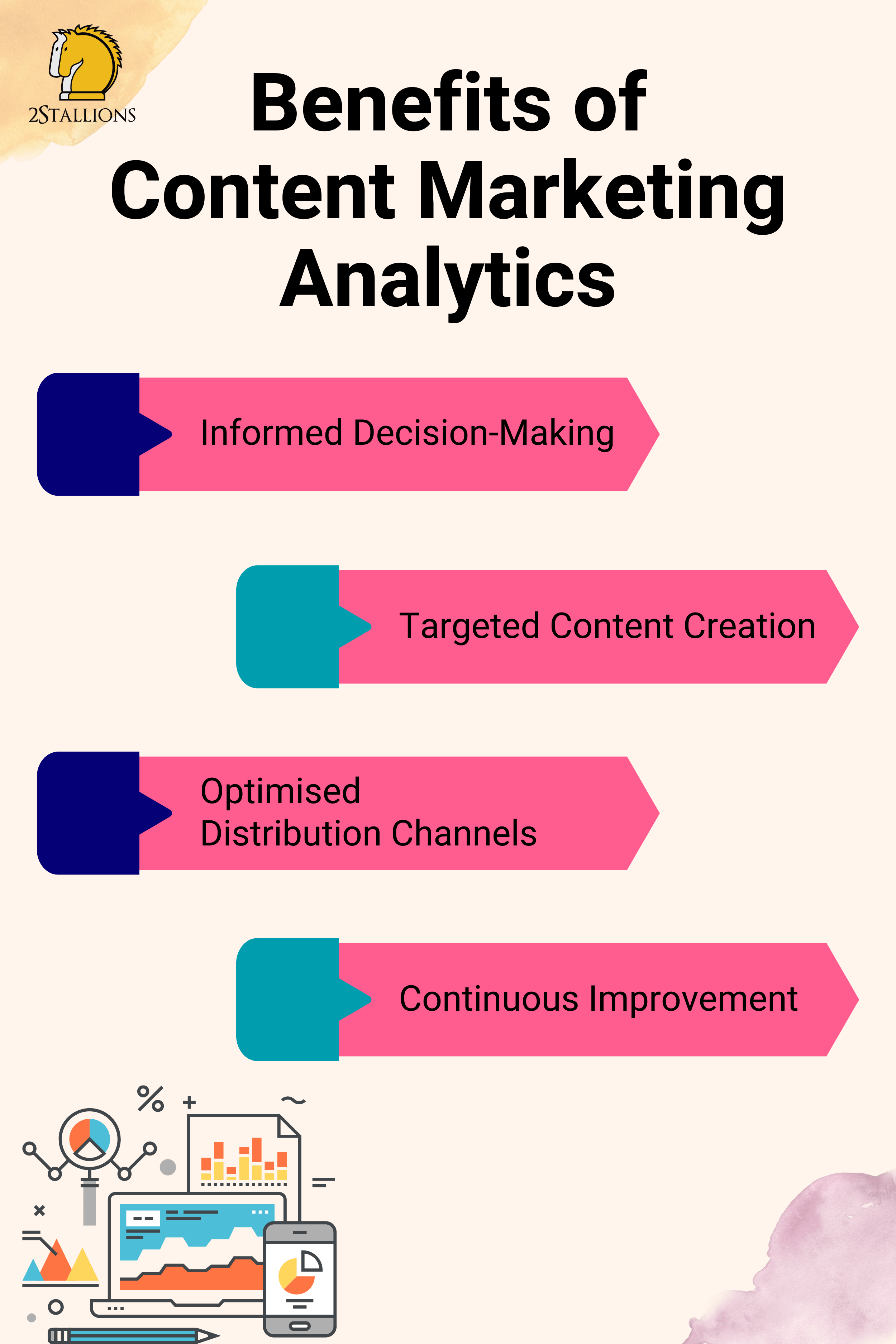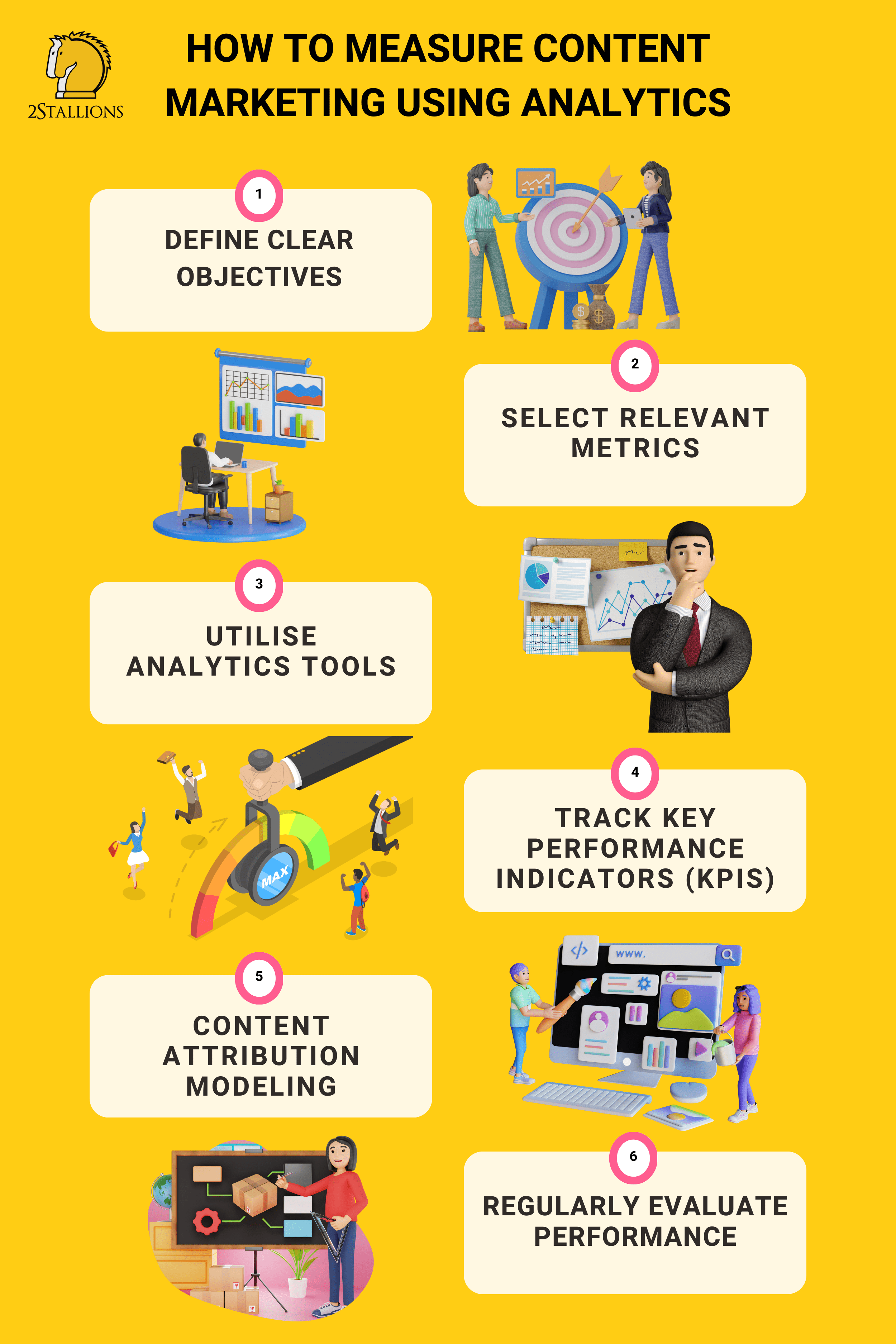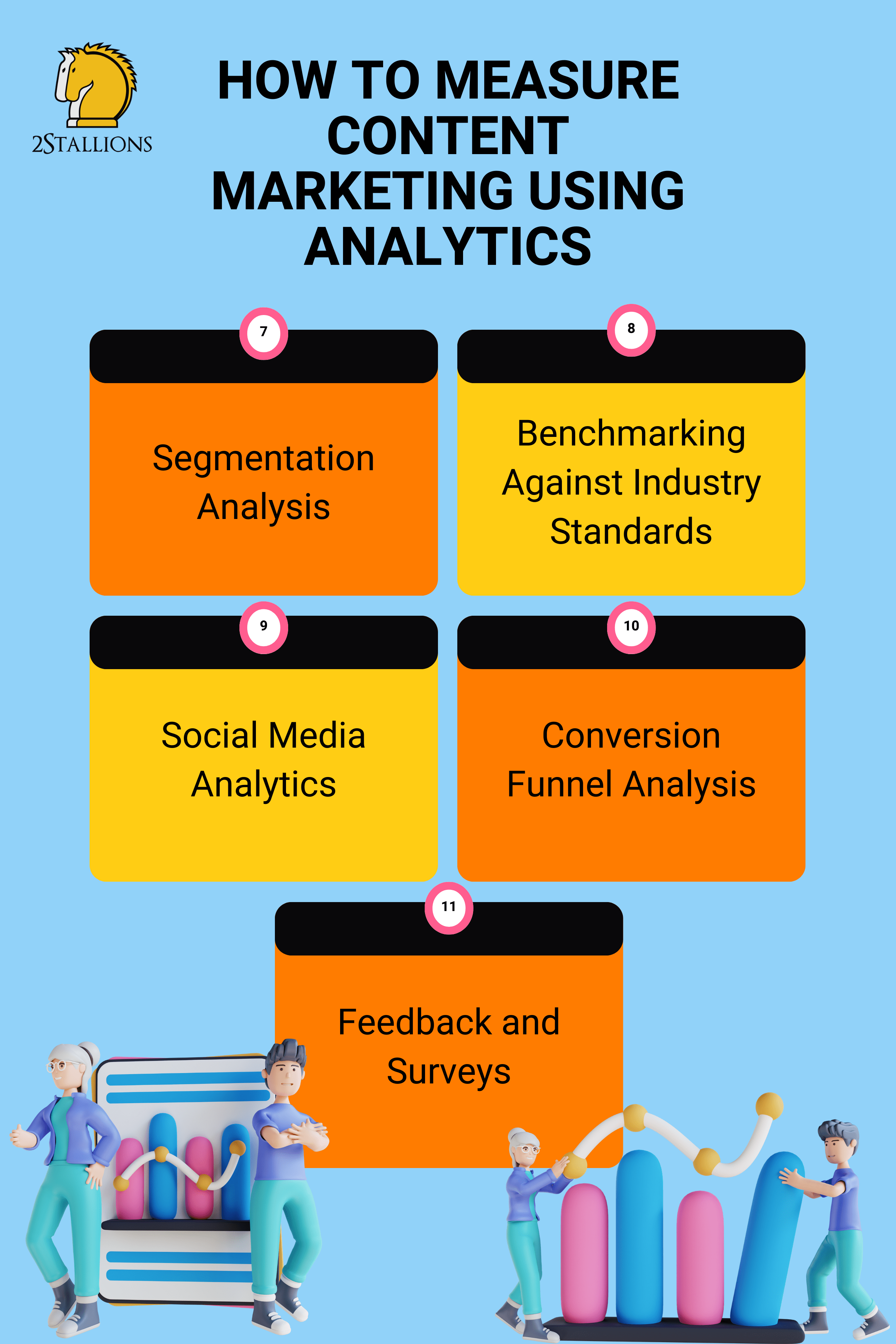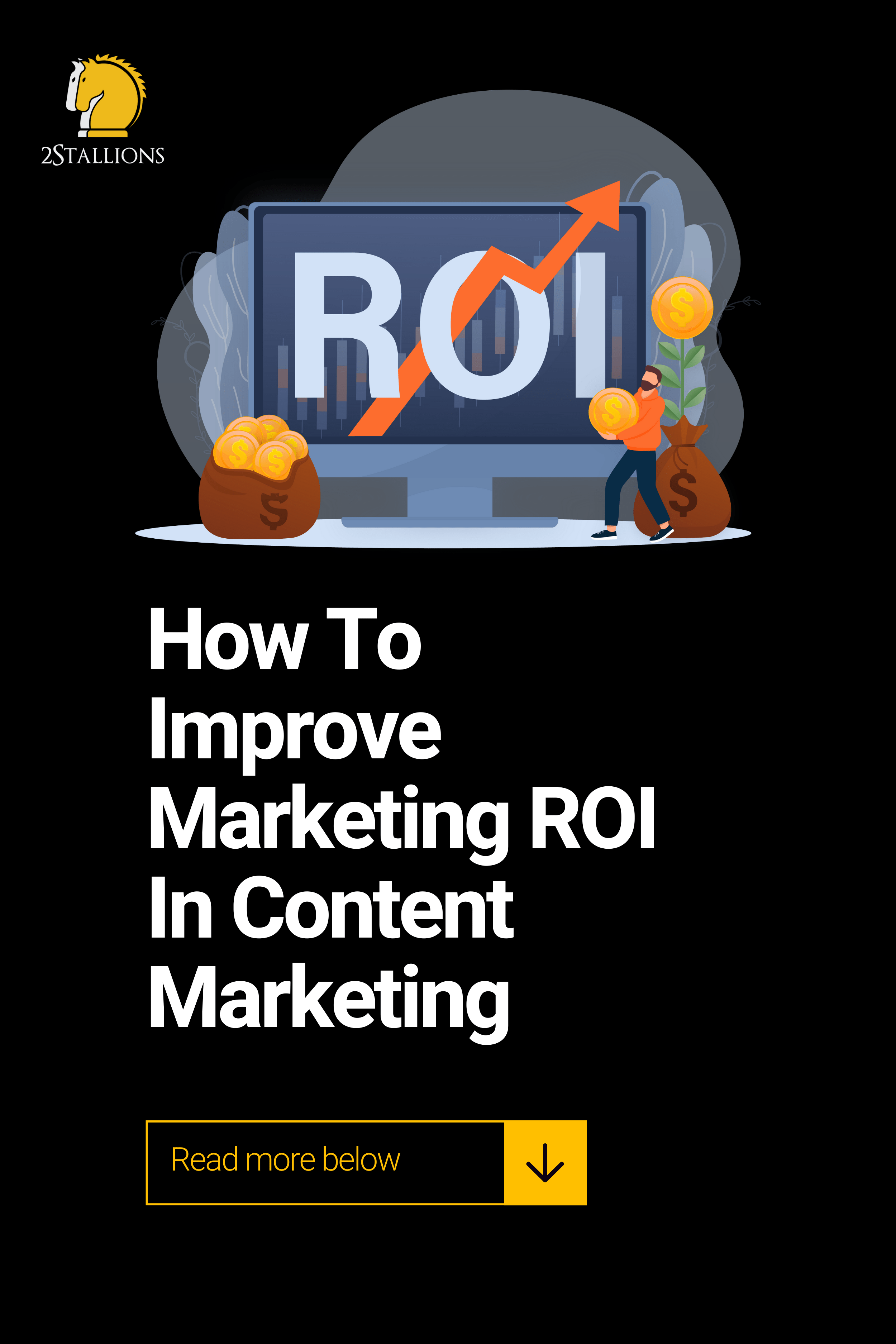SHARE

In the engaged digital marketing empire, where content reigns supreme, pursuing an effective and impactful content marketing ROI is more crucial than ever. The transformative catalyst for achieving this lies in strategically utilising content marketing analytics and comprehensive content marketing reporting.
What Is Content Marketing Analytics
Content marketing analytics is the backbone of a successful digital strategy, providing invaluable insights into the performance and impact of content initiatives. It involves systematically collecting, analysing, and interpreting data generated by content marketing efforts to inform strategic decision-making. By leveraging various analytics tools, marketers can understand how their content resonates with the audience and contributes to overall business objectives.
[thrive_leads id=’8342′]
Key Aspects of Content Marketing Analytics:
In the contemporary digital landscape, content marketing is a cornerstone strategy for businesses aiming to establish meaningful connections with their target audience. Yet, to truly amplify the effectiveness of content marketing endeavours, a crucial imperative lies in comprehending and leveraging the valuable insights furnished by analytics.
- Audience Engagement: Analytics help measure the level of engagement with content, including metrics like page views, time spent on a page, and social media interactions. Understanding audience behaviour allows marketers to tailor content to meet audience preferences.
- Conversion Tracking: Content marketing analytics enables the tracking of conversions, whether lead generation, sign-ups, or sales. By identifying which content pieces contribute most to conversions, marketers can optimise their strategies for higher conversion rates.
- Traffic Sources: Knowing where your traffic comes from is crucial for targeted content distribution. Analytics tools provide insights into website traffic sources, whether from search engines, social media, referrals, or direct visits.
- Content Performance: Analysing the performance of individual content pieces is vital. Marketers can identify top-performing content and understand why it resonates, allowing for the creation of more effective and engaging content in the future.
- Return on Investment (ROI): Content marketing analytics plays a key role in assessing the ROI of content initiatives. Marketers can determine the overall effectiveness of their content strategy by comparing the costs of content creation and distribution to the generated value.
Benefits of Content Marketing Analytics
In modern business, leveraging the benefits of content marketing analytics has become indispensable. This practice involves harnessing insightful data to optimise content strategies, ultimately enhancing engagement, reach, and overall impact on the target audience. Let’s delve into the advantages that arise from this strategic marriage of content marketing and analytics.
- Informed Decision-Making: Analytics empowers marketers to make data-driven decisions. Businesses can refine their content strategy for better results by understanding what works and what doesn’t.
- Targeted Content Creation: Insights from analytics help create content that addresses the specific needs and interests of the target audience, leading to increased engagement and brand loyalty
- Optimised Distribution Channels: Knowing where your audience is most active allows for strategic content distribution. Whether through social media, email, or other channels, analytics guides marketers in reaching their audience effectively.
- Continuous Improvement: Content marketing analytics fosters an iterative approach. Regular analysis and adjustments based on insights lead to continuous improvement in content strategies over time.
How To Measure Content Marketing Using Analytics
Effectively gauging the impact of content marketing relies on leveraging analytics, a vital tool for businesses striving to refine their strategies. By delving into analytical insights, organisations gain valuable data to assess the performance of their content, enabling informed decision-making and optimisation.
This practice enhances overall strategy and ensures a maximised impact on target audiences. The cooperation between content marketing and analytics is a cornerstone for strategic refinement and impactful outreach.
Define Clear Objectives
Start by establishing specific and measurable goals for your content marketing efforts. Clear objectives provide the foundation for meaningful measurement, whether increasing brand awareness, driving website traffic, generating leads, or boosting sales.
Select Relevant Metrics
Choose metrics that align with your defined objectives. Different goals require different metrics. For example:
- Brand Awareness: Track metrics like social media reach, brand mentions, and website traffic.
- Lead Generation: Focus on metrics such as form submissions, downloads, and email sign-ups.
- Sales: Measure conversion rates, revenue generated, and customer acquisition costs.
Utilise Analytics Tools
Leverage powerful analytics tools such as Google Analytics, Adobe Analytics, or specialised content marketing platforms. These tools offer insights into various aspects, including audience behaviour, traffic sources, and content performance.
Track Key Performance Indicators (KPIs)
Identify and monitor key performance indicators that directly reflect progress toward your goals. Common content marketing KPIs include:
- Click-through rates (CTR)
- Conversion rates
- Engagement metrics (likes, shares, comments)
- Time spent on page
Content Attribution Modeling
Understand the contribution of each piece of content to the overall conversion process. Attribution modelling helps assign value to touchpoints along the customer journey, providing insights into the content influencing conversions.
Regularly Evaluate Performance
Conduct regular evaluations of your content marketing performance against the defined metrics. Analyse trends, identify outliers and assess the success of specific campaigns. Regular reviews enable timely adjustments and improvements.
Segmentation Analysis
Segment your audience based on demographics, behaviour, or other relevant factors. Analysing content performance for different audience segments helps tailor future content to specific preferences and needs.
Benchmarking Against Industry Standards
Compare your performance metrics against industry benchmarks to gain a broader perspective. This benchmarking exercise helps identify areas where improvement is needed and highlights areas where you excel.
Social Media Analytics
If social media is a significant component of your content strategy, delve into social media analytics. Platforms like Facebook Insights, X Analytics (formerly known as Twitter Analytics), and LinkedIn Analytics provide post-reach, engagement, and audience demographics data.
Conversion Funnel Analysis
Track users’ journey through the conversion funnel. Identify any bottlenecks or drop-off points. Analyse the content contributing the most to moving users through the funnel and optimise accordingly.
Feedback and Surveys
Supplement quantitative data with qualitative insights. Collect feedback through surveys, comments, or direct interactions to understand audience sentiments and preferences.
How To Improve Marketing ROI In Content Marketing
Improving Marketing Return on Investment (ROI) in content marketing involves a strategic approach focused on optimising resources and maximising the impact of your content efforts.
Here’s a guide on how to enhance your Marketing ROI in content marketing:
Content Optimisation
- Regularly audit and update existing content to ensure it remains relevant and valuable.
- Utilise SEO best practices to enhance the visibility of your content in search engine results. Experiment with different formats (e.g., blog posts, videos, infographics) to identify what resonates best with your audience.
Audience Segmentation
- Analyse audience data to create targeted content for different segments.
- Personalise content to address different audience groups’ specific needs and interests, leading to increased engagement and conversion rates.
A/B Testing
- Conduct A/B testing on various content elements, such as headlines, calls-to-action, or visuals.
- Analyse the results to understand what elements contribute most to engagement and conversion, then optimise accordingly.
Conversion Funnel Analysis
- Track and analyse the customer journey through the conversion funnel.
- Identify bottlenecks or drop-off points and optimise content to guide users seamlessly through conversion.
Strategic Distribution
- Identify the most effective channels for reaching your target audience.
- Tailor your distribution strategy to focus on channels that deliver the best results, whether social media, email marketing, or other platforms.
Quality over Quantity
- Focus on creating high-quality, valuable content rather than producing a high volume of mediocre content.
- Quality content engages your audience and establishes your brand as an authority in your industry.
Promotion and Amplification
- Actively promote your content through paid and organic channels to increase its reach.
- Collaborate with influencers or industry partners to amplify your content to a wider audience.
Leverage User-Generated Content
- Encourage your audience to create and share content related to your brand.
- User-generated content adds authenticity to your marketing efforts and can be a powerful driver of engagement.
Data-Driven Decision-Making
- Continuously analyses data to gain insights into what’s working and needs improvement.
- Use data to inform future content strategies, ensuring they align with your business goals.
Invest in Long-Term Strategies
- While short-term gains are important, also invest in content that has long-term value.
- Evergreen content thought leadership pieces and comprehensive guides could continue to drive results over an extended period.
Customer Retention Through Content
- Develop content that nurtures existing customer relationships.
- Provide valuable resources, updates, and exclusive content to retain and engage your current customer base.
Measure and Iterate
- Regularly measure the performance of your content against key metrics.
- Use the insights gained to iterate and refine your content marketing strategies for continuous improvement.
Conclusion
In conclusion, maximising content marketing ROI demands a strategic embrace of analytics to optimise every facet of your content efforts. By harnessing the power of data-driven insights, businesses can make informed decisions, refine their content strategies, and ultimately amplify their impact on the target audience.
The fusion of content marketing and analytics is not merely a trend but a dynamic necessity in the digital landscape. As businesses navigate the ever-evolving realm of online engagement, the continuous utilisation of analytics is a steadfast compass, guiding them toward efficiency and the pinnacle of success in their content marketing endeavours.
Ready to Elevate With the Power of Expert Content Marketing Strategies With 2Stallions! Discover how we transform your brand’s potential through our data-based and wide industry knowledge. Let’s supercharge your online presence today! Get in touch with us and explore our Content Marketing Services
Originally published: 24 May 2023
Updated: 30 November 2023
Frequently Asked Questions about Maximising Content Marketing ROI
How do You Maximise Marketing ROI?
Maximising marketing Return on Investment (ROI) involves a strategic and data-driven approach. Here are the key steps:
- Set Clear Goals: Define specific and measurable objectives for your marketing campaigns. Whether it’s increased brand awareness, lead generation, or sales, having clear goals helps align strategies.
- Target the Right Audience: Identify and understand your target audience. Tailor your marketing efforts to reach the most likely convert audience, ensuring efficient resource allocation.
- Data-Driven Decision Making: Leverage analytics tools to gather insights into campaign performance. Analyse the data to understand what strategies are working and adjust your approach accordingly.
- Optimise Campaigns: Continuously optimise your campaigns based on performance metrics. This may involve adjusting targeting parameters, refining messaging, or reallocating budgets to channels that deliver the best results.
- Multichannel Integration: Implement a multichannel approach to reach your audience across various platforms. Integrated campaigns can reinforce your message and increase overall effectiveness.
- Focus on Customer Retention: Retaining existing customers is often more cost-effective than acquiring new ones. Implement strategies to nurture and engage your current customer base.
What is ROI in Marketing Analytics?
Return on Investment (ROI) in marketing analytics is a performance metric that evaluates the financial gains relative to the costs incurred in marketing activities. It provides a quantitative measure of the profitability and effectiveness of marketing campaigns.
In essence, marketing analytics ROI involves assessing the success of marketing initiatives by comparing the achieved results to the resources invested. This metric enables businesses to make informed decisions, optimise strategies, and allocate resources more efficiently based on data-driven insights.
What is ROI in Content Marketing?
Return on Investment (ROI) in content marketing represents the value generated by content initiatives compared to the resources invested. It transcends traditional metrics like engagement and reach, focusing on the tangible impact of content on business objectives.
Measuring content marketing ROI involves evaluating how content contributes to specific goals such as lead generation, conversion rates, and overall revenue. It serves as a crucial metric for businesses to understand the effectiveness of their content strategies and make informed decisions about resource allocation and content optimisation.
What are the 4 Steps Involved in Measuring Content Marketing ROI?
- Define Clear Objectives: Clearly outline the specific goals of your content marketing efforts, whether it’s brand awareness, lead generation, or sales.
- Choose Relevant Metrics: Select metrics that align with your objectives. This could include conversion rates, engagement metrics, or revenue generated from content.
- Utilise Analytics Tools: Leverage analytics platforms like Google Analytics to track and measure the selected metrics. Set up goal tracking and implement UTM parameters for detailed insights.
- Regularly Evaluate and Adjust: Continuously monitor the performance of your content against the defined metrics. Use the insights gained to make data-driven adjustments to your content strategy for ongoing improvement.

















